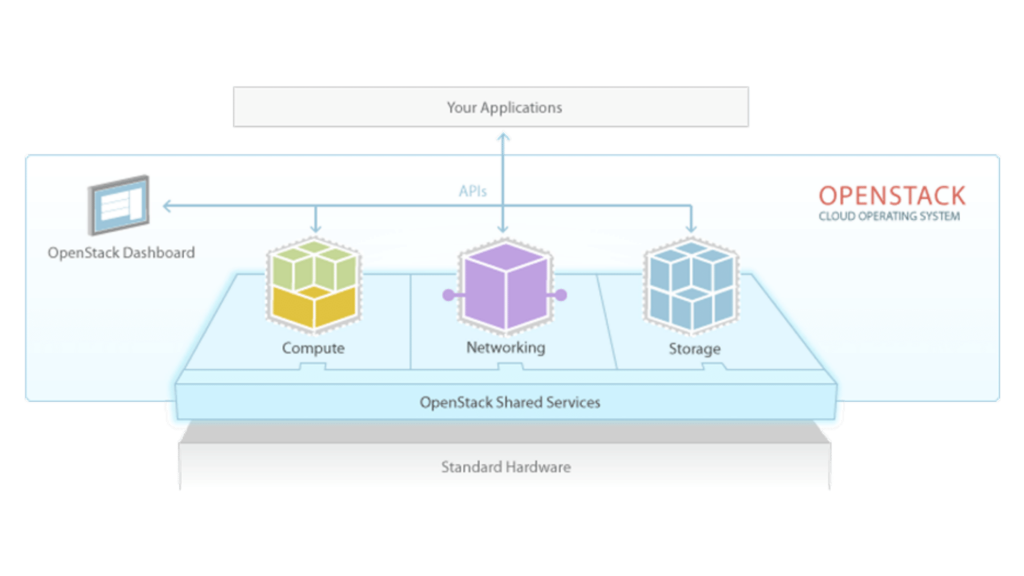
OpenStack is a free and open-source software platform for cloud computing, mostly deployed as an infrastructure-as-a-service (IaaS). The software platform consists of interrelated components that control hardware pools of processing, storage, and networking resources throughout a data center. Users either manage it through a web-based dashboard, through command-line tools, or through a RESTful API.
The demand for innovative virtualization solutions is growing due to the need for simplification and alliance of adaptability to optimize expenditure. Enterprise solutions that support cutting edge technology based allocation and scaling of storage are needed to address the dynamic nature of business need solutions and ultimately result in better ROI. The demand has resulted in the development of robust provisioning functions, allocation and use of compute, storage, as well as network by means of an OpenStack Cloud platform. OpenStack enables enterprises to develop and host flexible offerings with faster provisioning, in public, private, or hybrid cloud platforms.

IrisLogic provides OpenStack Cloud services with end-to-end support for analysis, implementation, deployment and monitoring of web and mobile applications on an OpenStack Cloud Platform. We help businesses accelerate the adoption of cloud computing strategy within the groups to consolidate and improve hardware resource utilization. Our approach leverages existing IrisLogic tools to enhance development productivity, reduce time to market and lower cost of ownership.
Services Offered
IrisLogic’s OpenStack Cloud Services help in building virtualized cloud environments by using infrastructure and by leveraging different services provided
by OpenStack to rapidly build and deploy web, mobile, or hybrid applications on private/public/hybrid cloud. Some of our services include:
- Nova compute service VMs on Openstack Cloud with lowered cost of ownership
- Our global services for server images for effective utilization
- Use of Keystone RabbitMQ Neutron VLANS and bridges through efficient networking and storage techniques
Benefits
Optimized costs and reduced TCO: IrisLogic OpenStack Cloud Services are available on subscription-based billing which considerably lowers your TCO. It increases cost effectiveness by hosting applications on OpenStack Cloud and further optimizing the hardware, software licensing and maintenance costs.
Improved business performance: Our solution enables agility, effectiveness, and massive scalability through its web-scale architecture on OpenStack Cloud, as well as dynamic provisioning and management of storage and computing resources.
Independence from vendor lock-in: We deliver solutions for all types of cloud platforms including public, private and hybrid, enabling you to easily federate or move between clouds, thus ensuring unencumbered data and services, as well as, not being locked-in to a specific cloud vendor.
Advantages
Our integrated OpenStack Cloud services enhance flexibility and interoperability for seamless deployment of enterprise solutions. Some of the advantages include:
- Functional expertise: We bring to the table proven assessment methodologies and skilled resources on OpenStack Cloud platform, thereby helping enterprises implement solutions more efficiently and effectively.
- Highly secure and reliable networks: Provide an extensible and robust framework for auto-provisioning of computing clusters as a service, dynamic provisioning of secure virtual networks equipped with adequate rules and policies. This enables easy and simple configuration and reliable monitoring of the firewall.
- OpenStack Testing Framework: Our framework provides a test suite to perform component based testing on different areas like Network, Block Storage, Object Storage and Image testing, etc. for reduced errors.
IrisLogic OpenStack key technology focus areas
Key areas of focus are:
- Compute (Nova) to manage and automate pools of computer resources and can work with widely available virtualization technologies, as well as bare metal and high-performance computing (HPC) configurations. Using KVM, VMware, and Xen choices for hypervisor technology (virtual machine monitor), together with Hyper-V and Linux container technology such as LXC
- Image Service (Glance) that provides discovery, registration, and delivery services for disk and server images.
- Object Storage (Swift) as a scalable redundant storage system. Objects and files maybe written to multiple disk drives spread throughout servers in the data center, with the OpenStack software responsible for ensuring data replication and integrity across the cluster.
- Dashboard (Horizon) that provides administrators and users a graphical interface to access, provision, and automate cloud-based resources.
- Identity (Keystone) that provides a central directory of users mapped to the OpenStack services users can access. Acts as a common authentication system across the cloud operating system and can integrate with existing backend directory services like LDAP.
- Networking (Neutron) for managing networks and IP addresses. OpenStack Networking ensures the network is not a bottleneck or limiting factor in a cloud deployment, and gives users self-service ability, even over network configurations.
- Block Storage (Cinder) provides persistent block-level storage devices for use with OpenStack compute instances. The block storage system manages the creation, attaching and detaching of the block devices to servers.
- Orchestration (Heat) as a service to orchestrate multiple composite cloud applications using templates, through both an OpenStack-native REST API and a CloudFormation-compatible Query API.
- Elastic Map Reduce (Sahara) to provide users with simple means to provision Hadoop clusters by specifying several parameters like Hadoop version, cluster topology, nodes hardware details and a few more.
- Bare Metal Provisioning (Ironic) specifically aims to provision bare metal machines instead of virtual machines.
